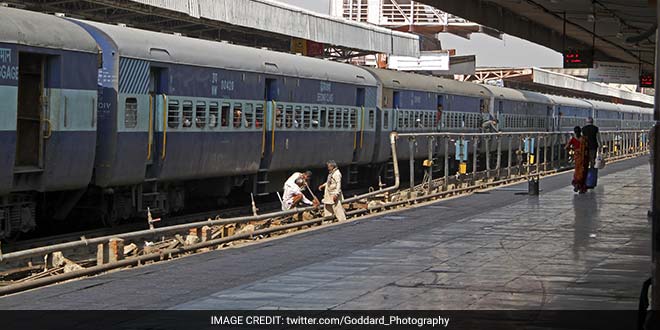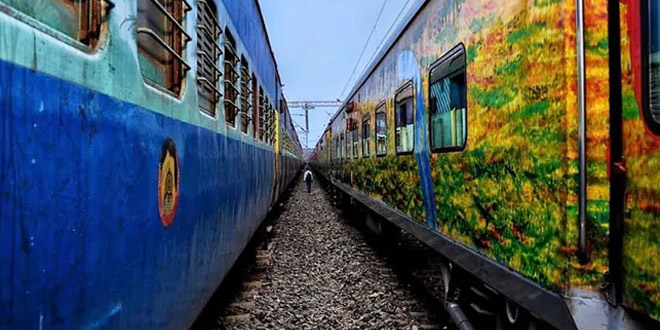New Delhi: Installation of bio-toilets is being touted as one of the biggest achievements of the Railway Ministry as 60 percent of the coaches have already been fitted with these eco-friendly toilets so far. “The toilets on the entire rail network, whether passenger trains, Express, Duronto, Rajdhani or unreserved ones, will be replaced with bio toilets. The work on the balance is going on expeditiously and by next year, it will be 100 percent bio toilets in the railways,” the Railways Minister Piyush Goyal said. Recently, Railway Minister Piyush Goyal took to Twitter to declare that Indian Railways has installed highest ever bio-toilets in train coaches in 2017-18, which is 64 percent higher than last year, taking the total number of bio-toilets in coaches to 1.25 lakh.
In line with PM @NarendraModi's 'Swachh Bharat Mission', Indian Railways has installed highest ever bio-toilets in train coaches in 2017-18, which is 64% higher than last year, taking the total number of bio-toilets in coaches to 1,25,000. https://t.co/82fXu5f0QT pic.twitter.com/29ksC0nios
— Piyush Goyal (@PiyushGoyal) April 13, 2018
Also Read: Swachh Rail-Swachh Bharat: Why The Big Push To Bio-Toilets?
Notably, the work to install bio-toilets in trains actually begun back in January 2011 with the introduction of 57 bio-toilets in the Gwalior-Varanasi Bundelkhand Express train. Now, the Railway ministry has advanced the earlier deadline of fitting bio-toilets in its entire fleet from 2021-2022 to 2019, and an outlay of Rs 1,220 crore has been provided for completion of this work.
Also Read: As Bio-Toilets Clog, Railways Turns To Vacuum Toilets In 13 Trains
To achieve the target of 100 per cent bio toilets, railway workshops have been instructed to compulsorily install bio-toilets in all existing in-service eligible coaches undergoing mid-life rehabilitation and periodical overhaul.
The work was on to retro-fit additional vaccum-assisted flushing units in these toilets, which have been developed with the help of the Defence Research and Development Organisation (DRDO) under the ‘Make In India’ drive instead of importing them,” said the railways minister.
He further added that this will completely eliminate defecation on the tracks, which apart from being unhygienic also affects rail safety because the uric acid can damage the tracks and cause accidents.
Also Read: Make Way For Aircraft-Type Bio-Vacuum Toilets On Indian Railways
As per our estimates, approximately 4,000 metric tonnes of human waste is discharged from train coaches every day. With the proliferation of bio-toilets in 60 percent coaches, commensurate human discharge in open has been eliminated, said one of the officials of Indian Railways.
Also Read: Eco-friendly Toilets, Nappy Changing Counters: Indian Railway Toilets Just Got Swankier
A bio-toilet looks exactly like a regular toilet but operates differently. In these bio-toilets, fitted underneath the lavatories, the human waste is collected (bio-digesters can hold up to 8,000 litres of human waste) and processed by anaerobic bacteria that converts it mainly into pathogen-free water and bio-gases – mainly Methane and Carbon Dioxide.
The gases escape into the atmosphere and waste water is discharged after chlorination onto the track. Human waste, thus, does not fall on the railway tracks, improving cleanliness and hygiene at platforms and eases the work of track and coaches maintenance staff.
Also Read: Now A Toilet That Can Flush Itself: Rajdhani, Shatabdi To Have High-End Toilets In 29 Trains
NDTV – Dettol Banega Swachh India campaign lends support to the Government of India’s Swachh Bharat Mission (SBM). Helmed by Campaign Ambassador Amitabh Bachchan, the campaign aims to spread awareness about hygiene and sanitation, the importance of building toilets and making India open defecation free (ODF) by October 2019, a target set by Prime Minister Narendra Modi, when he launched Swachh Bharat Abhiyan in 2014. Over the years, the campaign has widened its scope to cover issues like air pollution, waste management, plastic ban, manual scavenging and menstrual hygiene. The campaign has also focused extensively on marine pollution, clean Ganga Project and rejuvenation of Yamuna, two of India’s major river bodies.

























Madhusudan Palnitkar
January 25, 2020 at 8:05 pm
Indian rilways may be knowing how to collect the methane gas generated in bio toilets and convert samwe to bio CNG which can be used to run the Trains at time with suitable kit conversion for Diesel Engine to CNG engine like buses.Hope our railway Engineers will make good use of humane wste collected in Bio Toilet.
Madhusudan Palnitkar
January 25, 2020 at 8:09 pm
Let us decide to free our country of all kinds of wste and make our country really swachh by end of 2020 by adopting technologies availble for Bio degradable waste to Compressed Bio Methane and waste rubber and plastic to light diesel oil through Pyrolysis.